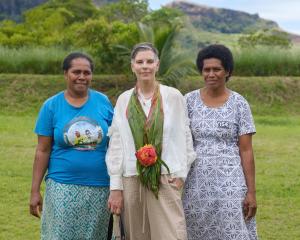From the unmentionable to the unrecognisable, the workers at Dunedin’s Op Shop on St Andrew have seen it all over the past half-century.
The business, run by Presbyterian Support Otago, turned 50 yesterday.
Volunteers and staff dressed up in colourful clothing and enjoyed some cake at the store to celebrate.
The store was first managed by Mary Williamson, now 99, who was there to cut the birthday cake yesterday.
Mrs Williamson said much had changed over the years, but one constant was how much students loved vintage clothing.
They were always interested in "anything outdated".

When she was first approached by members of the organisation to see if she was interested in running the store she said no straight away.
With four children at home she did not think it was a good idea.
After thinking about how much clothing was being thrown away, speaking to a few friends and having her arm twisted a bit, she reconsidered and quickly came to love the store.
She was proud of how far it had grown.
Retail manager Fiona Dodds said the entire culture around op shopping had changed since the store opened.
The workers used to hang a curtain up over the window to stop customers feeling embarrassed about shopping second-hand.
Now shopping second-hand was seen as an environmentally conscious and cool thing to do.
There had been all manner of objects donated over the years.
Often a strange or rare item would be donated and the volunteers would put a note under it asking customers if they knew what it was, such as a set of vintage surveying equipment, she said.
She remembered one occasion where the workers could not figure out how to turn off an "inappropriate" battery-powered object which had activated by itself.
Once a collection of war medals had been dropped off along with some other items, so the workers reached out to the family and got their blessing to sell them.
Vintage buttons were a commonly donated high-value item, as people often did not realise how much they were worth.
Team leader Lucy Knott said the store was often frequented by students, elderly people and those who could not afford expensive new clothing.
Frequent customers would regularly show up just to enjoy the company of the staff and volunteers.












